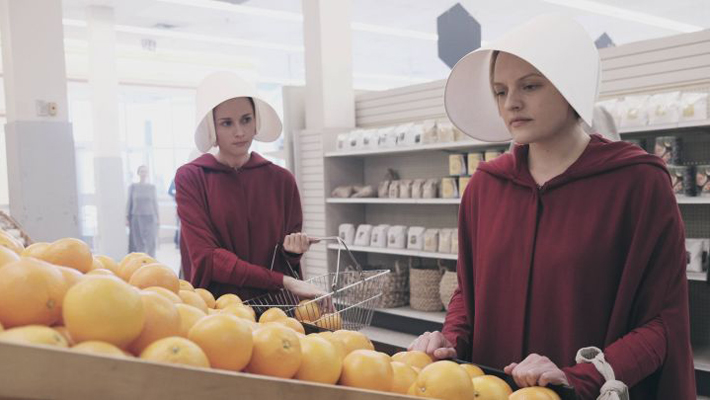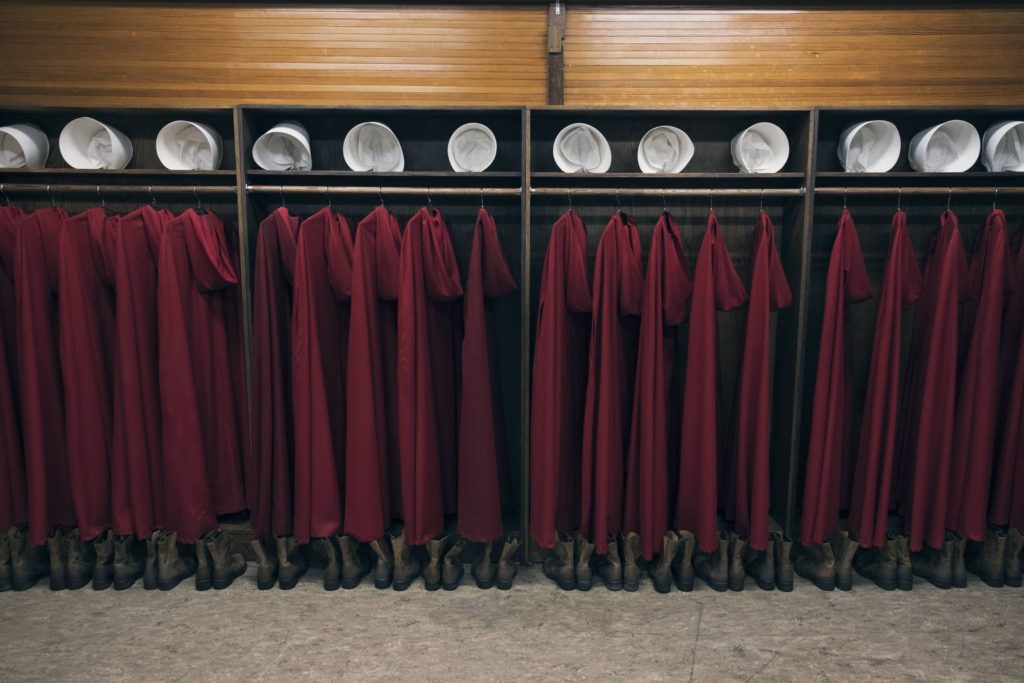I don’t want to talk about The Handmaid’s Tale. I want to scream about it. I want to break stuff about it. I want half the characters to be real so that I can protect them, and the other half so that I can kick their asses. I am telling you this, you with the eyes and the superior taste (thanks for stopping by, we’re always glad to see you) to beg your indulgence, because you may not prefer the approach I take to reviewing The Handmaid’s Tale -a basic plot synopsis and appraisal of a “this is good” or a “that is bad,” simply isn’t sufficient. Because like the book it is based around, The Handmaid’s Tale is not designed to entertain. It is intended to cleave and break and leave your rendered meat for the carrion to peck at.
Because it is fundamentally impossible to discuss any aspect of the first episode without also allowing the premise of the story, let’s get that handily out of the way, and dip our toes into the dystopian Canadian future. The majority of women have been left barren, and those who remain fertile are valued as wombs, while barely registering as people. They are called handmaids (thus the name), Offred, our heroine and conduit, is one. She had a husband, a child, but her daughter was taken from her and her husband killed. Offred is conditioned, trained, through repetition and fear and shame, into obedience to her new purpose -to bare children for the husbands of rich, barren women. Offred, who we know through flashbacks is an educated, liberal woman, adapts to survive. She accepts the new world order, which is retrograde and vicious, as an almost reverse form of evolution -survival of the meekest. The first episode beautifully resists the urge to dump exposition as to the what and how or even the why of this new world. We, the audience, are Offred, and we go along.

There are going to be a million thought pieces published on The Handmaid’s Tale in the coming days. And make no mistake, there should be, as many dissections and examinations are there as are heads to house them. But we, you and I, we have a limited word count and no commitment to the scientific method, so here is what I propose, as we move forward with these reviews. We will focus on the implementation, implications and through-lines of specific themes and tropes. Let’s count ‘em off:
“Return to traditional values” -the line is mentioned in the first episode as a justification and rationalization for the designated state of society. Such an innocuous, even admirable sounding phrase, until you consider two questions -whose values and what traditions? Where the book was prescient, the show is timely, and in returning to this theme, we will perhaps be drowned in echoes of our own reality, so wear a snorkel. One need look no further than the roll back on reproductive rights to see this currently in action. Spoiler alert: I will attempt to maintain some political neutrality in these reviews. Spoiler alert part two, electric boogaloo: I will fail.
Code Speak -while it is established quickly that there are spies in this society, referred to as eyes, we will be looking for code in other places as well. The Handmaid’s Tale is rife with double speak, and hidden meaning -from the traditional greeting of “peace be with you”, to the much more uncomfortable and creeping “blessed be the fruit” (a reminder that the vessel the “fruit” is delivered in can bless itself or not, and society will not care), all the way through to a conversation regarding tuna between Offred and the kitchen maid, spoken language is often a code meant as much for the listener as for the speaker. And we, dear friends, are going to try to break that code.
“They’re good at making us distrust each other” -What are the implications of a society that’s very foundation is based around insuring that no member is ever fully confident in the other? Trust is a significant aspect of The Handmaid’s Tale, from basic, interpersonal relationships, to the greater implications of the figureheads and governments that shape our daily lives.
“Keep your head down. All this crazy shit is going to end.” -here we’ll look at the things that a good person can close their eyes to when they are struggling to survive, and when they believe that a bad situation will be fleeting. To draw a parallel to our current administration feels beyond heavy handed, so I will just waggle my eyebrows and trust you to follow the breadcrumbs. We will also look to the ways this mentality can begin to warp and affect a person over time.
And finally, perhaps almost too obviously, we will look at the myriad ways that Femininity equals fertility. And the inevitable dangers of reducing a woman to only the children she can or cannot produce.

Guys, I am very excited about this. The original book -which I have not read in about ten years, so a lot of this feels more like déjà vu than actual familiarity -was feminist in the truest sense; in that it demanded equality in all things, including culpability and, when appropriate, blame. The first episode bodes well for remaining true to that theme, and I am hopeful for both where the show is going and these reviews.
Because The Handmaid’s Tale is such a strongly feminine show, and my reading, as a woman, will be colored by my experience, I will close each review with a segment called “What did Jim think?”, where my co-worker and designated lunch-buddy Jim will offer a male perspective. At press time (a phrase I am only using because it makes me feel important), he had not yet watched the show, but was aware of it by concept and trailer, so, for the first ever What did Jim think?, here’s what he said: “Opinions are my speciality [sic] and a man’s opinion is always a good idea. Feel free to quote me on that. I’m sure it’s an idyllic utopia for us men but I will have to watch to confirm that.”
Alright, guys, let’s do this. And until tomorrow, don’t let the bastards grind you down.

I’m hooked! Can’t wait to follow this show.
Kelly,
Your humor, wit and most importantly, sarcasm never ceases to entertain me. Keep up the good work.
Valerie
Thanks, guys! I am very open to the idea of a lively comments section-I’d love to hear and discuss other views of the show!
I loved your insight into this series. Looking forward to your next segment
Gayle (a friend of Mommy)